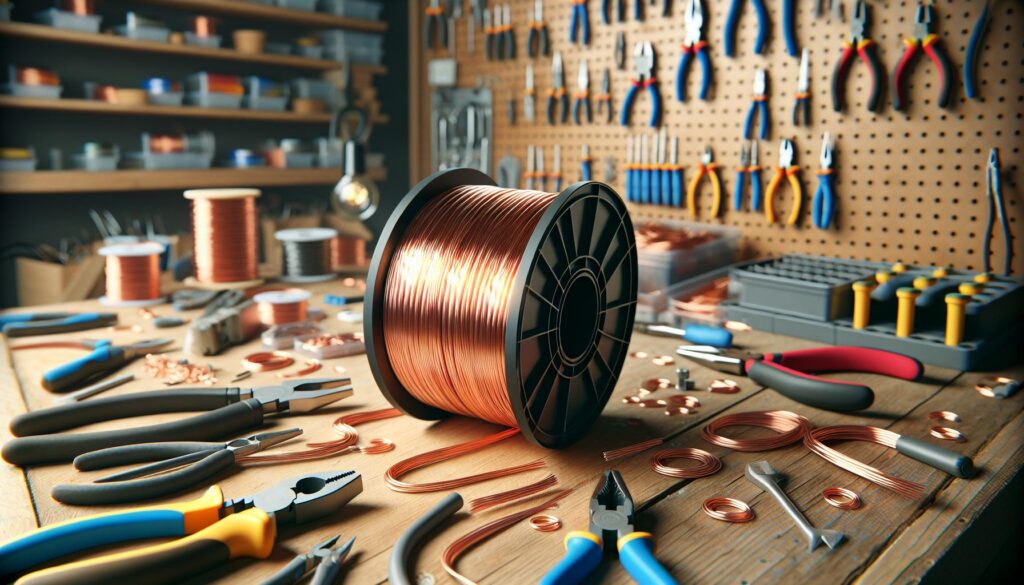When it comes to electrical wiring, understanding the gauge of wire is crucial for safety and efficiency. Twelve AWG wire, or American Wire Gauge, is a popular choice among electricians and DIY enthusiasts alike. Its versatility makes it suitable for a variety of applications, from household wiring to automotive projects.
This wire size strikes a balance between current-carrying capacity and flexibility, making it ideal for both indoor and outdoor use. Whether powering appliances, lighting, or even tools, 12 AWG wire stands out as a reliable option. Let’s explore the many uses of this essential wiring and why it’s a go-to for many electrical projects.
What Is 12 AWG Wire Used For
12 AWG wire, measuring 2.05 mm in diameter, serves various electrical applications due to its balance of flexibility and current-carrying capacity. It typically handles up to 20 amps safely in residential settings and can deal with larger loads for specific applications.
Common Applications
- Household Wiring: 12 AWG wire is widely used for general branch circuits, powering outlets and lighting fixtures in homes. It fits standard 20-amp circuit breakers, delivering power safely for everyday activities.
- Appliance Connections: Many household appliances such as refrigerators, washing machines, and microwaves incorporate 12 AWG wire. Its ability to support higher currents ensures reliable operation of essential devices.
- Outdoor Lighting: 12 AWG is commonly used for outdoor lighting circuits. Its durable construction withstands environmental factors, making it suitable for garden lights and landscape installations.
- Automotive Applications: In automotive scenarios, 12 AWG wire links components such as sound systems and battery connections, where moderate current loads are present.
Advantages of 12 AWG Wire
- Versatility: 12 AWG wire adapts to a wide range of projects, whether residential, commercial, or automotive.
- Safety: Its amperage rating prevents overheating in typical household circuits, enhancing safety during operation.
- Flexibility: The wire’s malleability allows for easy installation around tight corners and through conduits.
- Not Suitable for Heavy Loads: 12 AWG wire isn’t ideal for applications requiring higher amperage, such as major power tools or industrial machinery.
- Length Limitations: The maximum effective length for 12 AWG wire decreases with increased load, leading to voltage drop issues over long distances.
12 AWG wire continues to be a preferred choice among electricians and DIY enthusiasts for its reliability and adaptability across various electrical applications.
Common Applications of 12 AWG Wire

12 AWG wire is widely used in various applications, including residential, commercial, and automotive settings. Its versatility and safety features make it a top choice for many projects.
Residential Wiring
12 AWG wire frequently connects outlets, switches, and lighting fixtures in residential settings. It supports larger appliances, enabling safe operation of devices like refrigerators and microwaves. This wire type also serves as a reliable choice for circuit breakers and branch circuits, ensuring adequate power supply for household needs. For instance, 12 AWG wire can accommodate around 20 amps, making it ideal for general lighting and receptacle circuits while preventing overheating risks.
Commercial Wiring
12 AWG wire extends its applications into commercial wiring, supporting various equipment and fixtures. It powers overhead lighting systems, HVAC units, and other essential devices, providing a robust and efficient power supply. It’s suitable for both indoor and outdoor commercial environments, facilitating wiring for signage and exterior lighting. In commercial buildings, it helps maintain compliance with safety regulations while maximizing energy efficiency for operational needs.
Automotive Applications
In automotive applications, 12 AWG wire excels in powering sound systems, battery connections, and auxiliary equipment. It offers the necessary current capacity to support high-demand components, ensuring reliable performance. Mechanically resilient, this wire withstands vibrations and heat typical in automotive environments. 12 AWG wire is often used in modifications and upgrades, allowing DIY enthusiasts to enhance their vehicles’ electrical systems effectively.
Benefits of Using 12 AWG Wire
12 AWG wire offers numerous advantages in various electrical applications, making it a preferred choice among professionals and DIY enthusiasts.
Conductor Size and Capacity
Conductor size directly influences the current-carrying capacity of electrical wiring. The 2.05 mm diameter of 12 AWG wire allows it to handle up to 20 amps safely in residential settings. This capacity makes it suitable for powering household appliances, lighting systems, and tools without risking overheating. The consistent ability to support these loads enhances efficiency and minimizes potential safety hazards.
Flexibility and Handling
Flexibility of 12 AWG wire makes installation straightforward across different environments. Its pliable nature allows for easy maneuverability around corners and tight spaces, reducing the time and effort required for setup. This adaptability facilitates quick adjustments, whether in residential projects or automotive applications, resulting in an efficient installation process.
Choosing the Right 12 AWG Wire
Selecting the appropriate 12 AWG wire requires consideration of various factors, including insulation types and length and gauge considerations. Understanding these elements ensures optimal performance and safety in electrical applications.
Insulation Types
Different insulation types affect the wire’s performance in various conditions. Common insulation types for 12 AWG wire include:
- PVC (Polyvinyl Chloride): Provides basic protection against moisture and abrasion, suitable for indoor applications.
- THHN/THWN: Offers heat and moisture resistance, ideal for both indoor and outdoor use, often found in residential and commercial wiring.
- UL 1015: Withstands higher temperatures, making it appropriate for specialized applications like industrial equipment.
- XLPE (Cross-Linked Polyethylene): Handles extreme temperatures and harsh environmental conditions, a top choice for outdoor projects.
Choosing the right insulation type aligns with the project’s specific requirements and environmental factors.
Length and Gauge Considerations
Length and gauge influence voltage drop and current capacity in electrical systems. Key points include:
- Length: Longer lengths increase resistance, leading to potential voltage drops. For runs longer than 100 feet, consider using a thicker wire.
- Gauge: While 12 AWG wire suits many applications, evaluating the load is essential. Devices requiring more power may necessitate a lower gauge wire for optimal performance.
Understanding these considerations helps ensure a safe and efficient electrical setup, aligning wire specifications with the project’s demands.
12 AWG wire stands out as a versatile and reliable choice for various electrical applications. Its ability to safely handle up to 20 amps makes it ideal for both residential and commercial use. Whether powering household appliances or connecting automotive components, this wire strikes a perfect balance between current capacity and flexibility.
With its range of insulation types and adaptability to different environments, 12 AWG wire ensures efficient performance while minimizing safety risks. For anyone involved in electrical projects, understanding the role of 12 AWG wire can enhance both safety and efficiency, making it an essential component in any toolbox.


